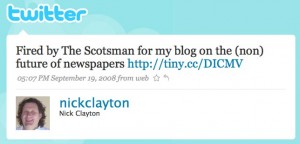Over on his blog, Andy Dickinson, who teaches digital and online journalism at the University of Central Lancashire, reflects on a question he posed via Twitter last night, while monitoring activity on the platform in relation to the violence taking place in London and beyond.
http://twitter.com/#!/digidickinson/status/100678058423488512
He said his question was prompted by Tweets from journalists outside London stating that nothing was happening on their patch. But other Twitter users were quick to cast doubt on his statement.
His blog post details the points made, but one of their points was that the value of what a journalist reports is not always about news but the provision of information. That, as a trusted source, journalists could let the online community know whether or not there was substance in rumours circulating on sites such as Twitter, that violence was building elsewhere.
Ultimately Dickinson “held up his hands” (via a hashtag), and his subsequent blog post today (9 August), reflecting on the issue, and some elements of the argument he still stands by, gives some food for thought about the use of social media by journalists in these sorts of situations.
Despite protestations of its importance ‘no news’ statements like that would never make the front page or head of a bulletin. As Neil Macdonald pointed out that they where [sic] more information than news. Journalism as a source of information – very valid.
A few tweets did quote authoritative voices – police etc. That was better. Some proper information in there. Many did not.
Online video journalist Adam Westbrook also offers his thoughts in this blog post, on what he calls the “messy” situation for the media using social media/user generated content. He got caught up in the so-called “mess” when retweeting video footage which was originally linked to the wrong location.
On the plus side, I do think real-time web’s ability to self correct is extraordinary. My blunderous retweet was corrected within five minutes. If you don’t mind taking stern words from other users, it’s a rock solid facet to the platform.
However, Twitter being used by journalists, who (hopefully!) question sources and try to verify, is one thing. But non-journalists aren’t necessarily as skeptical of information. A rumour to a journalist could be read as fact by someone else, especially people who are scared.
